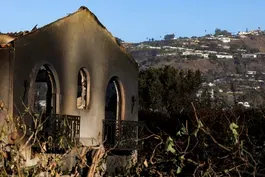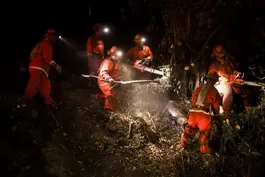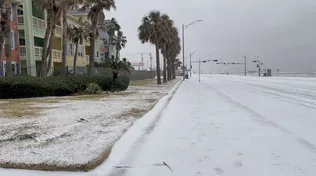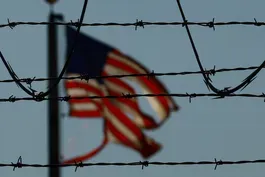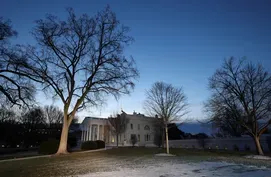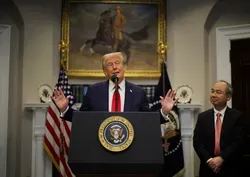
Trump begins push for more oil and gas production
Clip: 1/22/2025 | 7m 12sVideo has Closed Captions
Trump pushes for more oil and gas production and a roll-back of climate initiatives
Within hours of taking office, President Trump declared a national energy emergency as part of his plan to push for more oil and gas drilling and to heavily boost fossil fuels. He also started a process to reverse much of what the Biden administration did on greener energy. Geoff Bennett discussed more with Scott Waldman of Politico's E&E News.
Major corporate funding for the PBS News Hour is provided by BDO, BNSF, Consumer Cellular, American Cruise Lines, and Raymond James. Funding for the PBS NewsHour Weekend is provided by...

Trump begins push for more oil and gas production
Clip: 1/22/2025 | 7m 12sVideo has Closed Captions
Within hours of taking office, President Trump declared a national energy emergency as part of his plan to push for more oil and gas drilling and to heavily boost fossil fuels. He also started a process to reverse much of what the Biden administration did on greener energy. Geoff Bennett discussed more with Scott Waldman of Politico's E&E News.
How to Watch PBS News Hour
PBS News Hour is available to stream on pbs.org and the free PBS App, available on iPhone, Apple TV, Android TV, Android smartphones, Amazon Fire TV, Amazon Fire Tablet, Roku, Samsung Smart TV, and Vizio.
Providing Support for PBS.org
Learn Moreabout PBS online sponsorshipGEOFF BENNETT: Within hours of taking office, President Trump declared a national energy emergency as part of his plan to push for more oil and gas drilling and to heavily boost fossil fuels.
But that's not all.
The president also started a process to reverse much of what former President Biden did on green energy, big changes that could ease or end new regulations on greenhouse gases and cut development of electric vehicles.
And, as he did during his first term, President Trump said the U.S. will pull out of the international Paris climate treaty.
For more, we turn now to Scott Waldman, a White House reporter for Politico's E&E News.
Thanks for being with us.
So, Scott, the U.S. is right now producing more oil and natural gas than any other country in the world at any point in history.
So what does declaring a national emergency, a national energy emergency, actually do?
What does it achieve?
SCOTT WALDMAN, White House Reporter, E&E News By Politico: Well, Trump said that it was necessary because he wanted to ensure the -- basically, the security of the electrical grid, as well as the nation's security.
He claims that the grid is potentially unreliable and has been failing at some points, and that a big boost of energy is needed to fix that.
What the actual order will do in terms of what powers it will give him, they're very limited.
It's not going to give him a lot of additional powers to boost energy in this country.
Obviously, that's going to be based on the market and the willingness of drillers to put -- to do fracking throughout the country.
And that's not going to be really affected by this.
I think the way that the energy emergency is written is that it's supposed to alleviate some pressures that states and other entities have placed on, like, pipelines and other energy infrastructure in particular.
But just sort of declaring this with a stroke of a pen does not mean that you can supersede state and local laws.
I mean, the federal government doesn't have that power.
It can, of course, control what happens on federal land.
But a lot of this infrastructure is sited on private property, on state property throughout the country.
So it's not as simple as just declaring that we're going to have this big boost of energy because an emergency has been declared.
GEOFF BENNETT: So what then strikes you as the most significant action the president has taken on energy and environmental policy?
SCOTT WALDMAN: Well, certainly pulling out of the Paris climate agreement.
I mean, that is something everybody expected to do.
And that's going to take -- technically, it takes up to a year.
Trump has said he will do it immediately, but under the terms of the agreement, it should take up to a year.
It sort of takes the U.S. out of the leadership position when it comes to international negotiations and also sort of leading the way.
The Biden administration really tried to make the U.S. the leader once again, in particular in driving clean energy economy.
Regardless of what your politics are, I think the Biden administration demonstrated fairly thoroughly that there's a lot of energy jobs to be created in the clean energy space.
So that's one thing that Trump did.
I think also pulling back -- saying he's going to pull back some of the funding that is going to -- under the Inflation Reduction Act, which was really a climate-centric bill, some of that funding to E.V.
chargers to -- that's going to go to build battery factories for E.V.s.
Now, a lot of that has been congressionally appropriated, but I think the Trump administration, and we saw this today in the hearing with his pick to head the Office of Management and Budget, a man named Russ Vought, is basically saying that they're going to use -- they're going to go against the 1974 Impoundment Act, which would give the president power to withhold basically funding the Congress has appropriated when it comes to this clean energy.
I think that that is certainly a legally untested case that's going to end up being a fight that goes all the way to the Supreme Court, whether they can do that.
And I listened to a hearing last week where this was brought up.
And Senator Rand Paul from Kentucky was very critical of the administration's plan to potentially override Congress and withhold funding, even if that funding happened to be for clean energy projects.
GEOFF BENNETT: Right, and there are certainly market forces that continue to propel the transition to electric vehicles.
But can the Trump administration hold up the E.V.
tax credits?
SCOTT WALDMAN: You know, yes, they can sort of - - I think it's safe to say they're going to try.
Again, that money's congressionally appropriated.
Whether they can do that is going to be really up to a court fight coming up.
They have pledged to start withholding it.
And even Elon Musk, of course, the owner of Tesla, has signed off on that.
Musk himself believes that it'll hurt companies like GM and Ford more than it would hurt -- and Hyundai and other companies that are making E.V.s.
Musk thinks it'll hurt them more than it hurts Tesla.
But whether any of this survives the oncoming court battles remains to be seen.
GEOFF BENNETT: So, if you take the energy policy and combine it with the Trump administration pulling the U.S. out of the Paris climate accord, what impact might all of this have on efforts to curb the worst effects of climate change?
SCOTT WALDMAN: Well, certainly, Trump, who denies climate science, doesn't worry about climate change, and just scientists have said for many years that increasing fossil fuel use and consumption is going to drive the worst effects of climate change.
We're already seeing climate affecting us throughout the country.
Obviously, in Los Angeles right now, those wildfires have been fueled by climate change.
They have been made worse by climate change.
It didn't start the fires, but it's made them far worse by creating or contributing to dire drought conditions that have desiccated the landscape and just created fuel for that fire.
There's also areas where rising sea levels are claiming homes throughout the country.
So, certainly just leaning into fossil fuels, stripping away any plans to cut carbon emissions, it's going to make -- it's going to make that worse.
But, again, we're talking on such a long time scale here.
Four years of the Trump administration are not going to set back the U.S. efforts in a way that won't be fixable by some future administration down the line.
Obviously, every moment now, according to scientists, is important to combat climate change, but it's not like all hope is lost.
I actually talked to Biden's climate adviser, former climate adviser, Gina McCarthy, today, and she said she was cheered a little bit after seeing some of these Trump executive orders, because she said they're just not going to hold up in court.
And she knows more is coming to try to dismantle Biden's climate legacy.
But, really, she said it's going to take a lot more than what we have seen so far.
GEOFF BENNETT: Scott Waldman of Politico's E&E News, thanks for sharing your reporting and insights with us.
SCOTT WALDMAN: Thanks for having me.
A Brief But Spectacular take on art bringing people together
Video has Closed Captions
A Brief But Spectacular take on the art of bringing people together (3m 15s)
Gazans begin clearing rubble as tenuous ceasefire holds
Video has Closed Captions
Gazans return to homes in ruins and begin clearing rubble as tenuous ceasefire holds (5m 20s)
Honoring the lives lost in the Los Angeles wildfires
Video has Closed Captions
Honoring the lives lost in the Los Angeles wildfires (3m 6s)
Incarcerated firefighters help battle the blazes around LA
Video has Closed Captions
How incarcerated firefighters are helping battle the blazes around Los Angeles (6m 30s)
News Wrap: Storm brings record-breaking snow to Gulf Coast
Video has Closed Captions
News Wrap: Massive winter storm brings record-breaking snow to Gulf Coast (5m 28s)
Pentagon to send troops to border for Trump's crackdown
Video has Closed Captions
Pentagon will send troops to southern border to carry out Trump's immigration crackdown (6m 7s)
Trump administration ends government diversity programs
Video has Closed Captions
Trump administration ends government diversity programs and takes aim at DEI nationwide (4m 34s)
Trump issues more orders targeting immigration and DEI
Video has Closed Captions
Trump issues more executive orders targeting immigration and DEI (3m 25s)
Trump order cancels flights for refugees to settle in U.S.
Video has Closed Captions
Refugees already cleared to settle in U.S. have flights canceled after Trump order (6m 8s)
Providing Support for PBS.org
Learn Moreabout PBS online sponsorshipMajor corporate funding for the PBS News Hour is provided by BDO, BNSF, Consumer Cellular, American Cruise Lines, and Raymond James. Funding for the PBS NewsHour Weekend is provided by...



